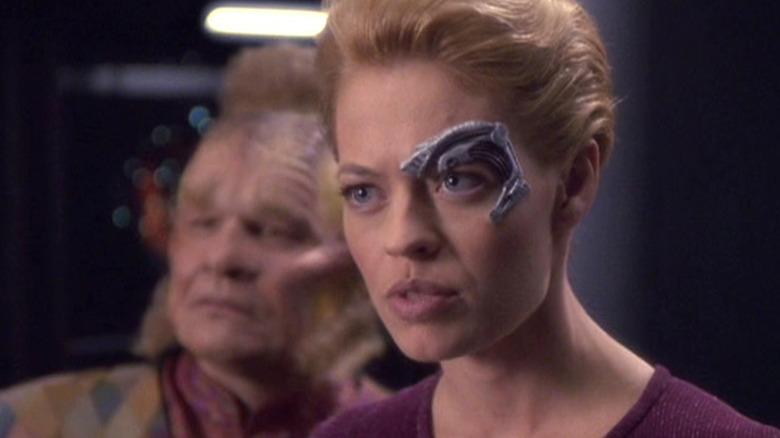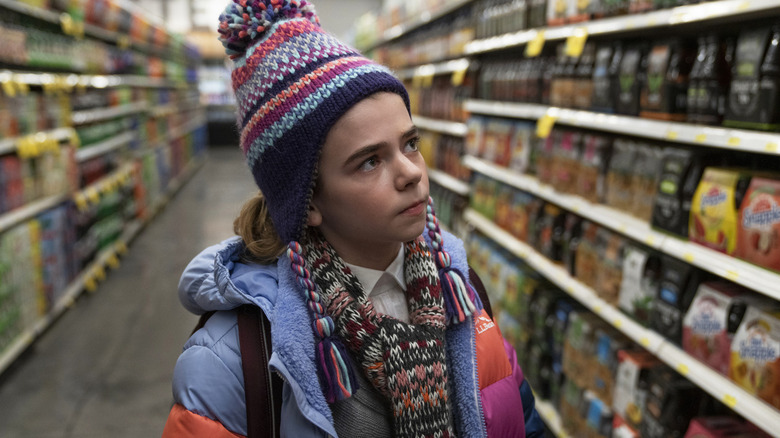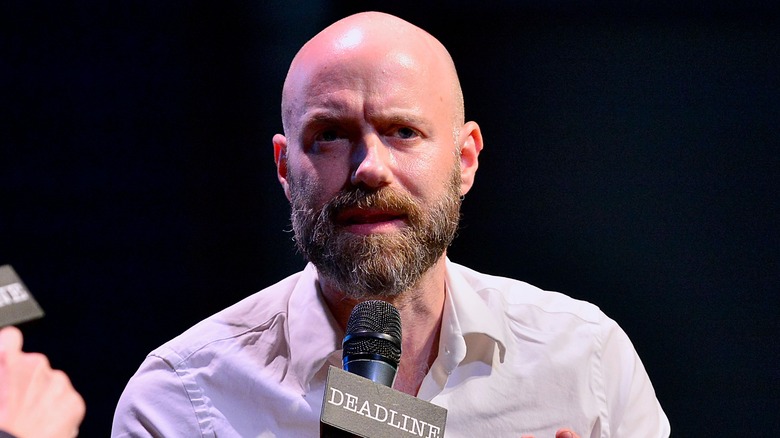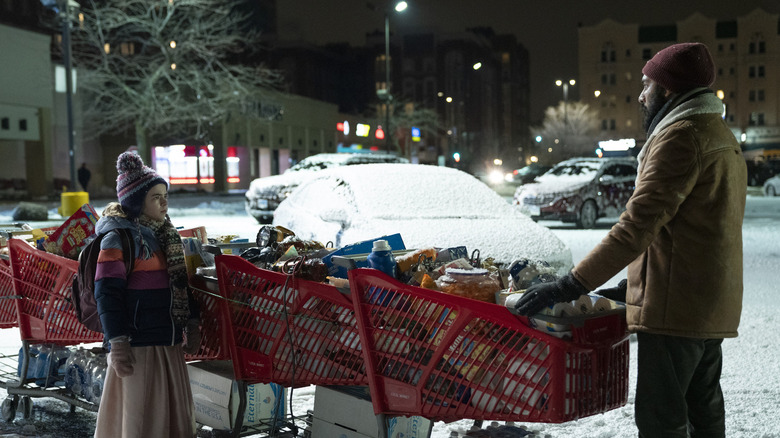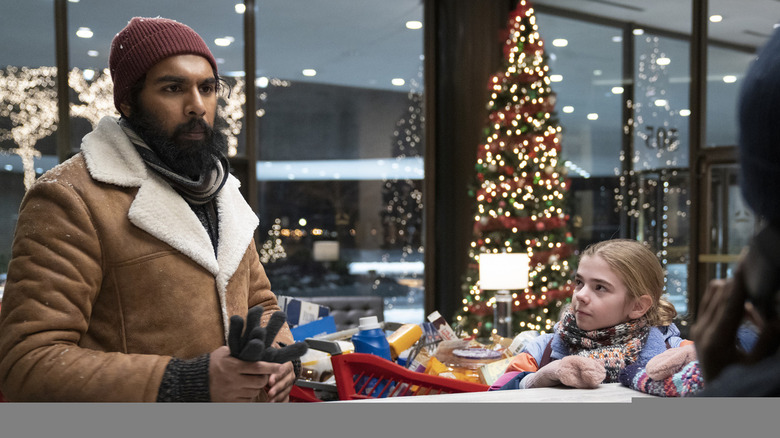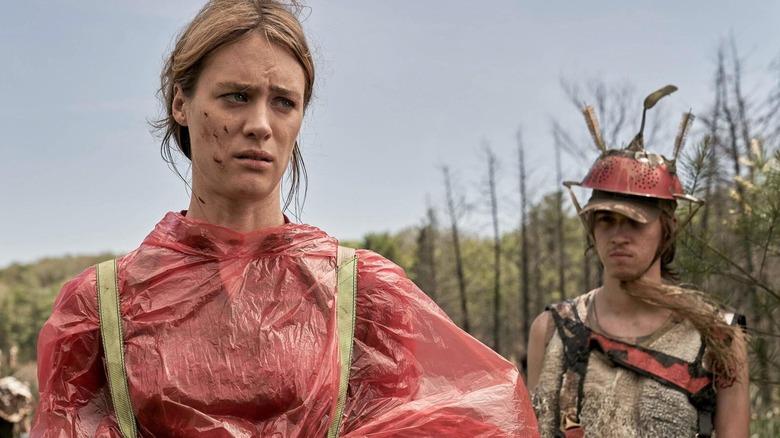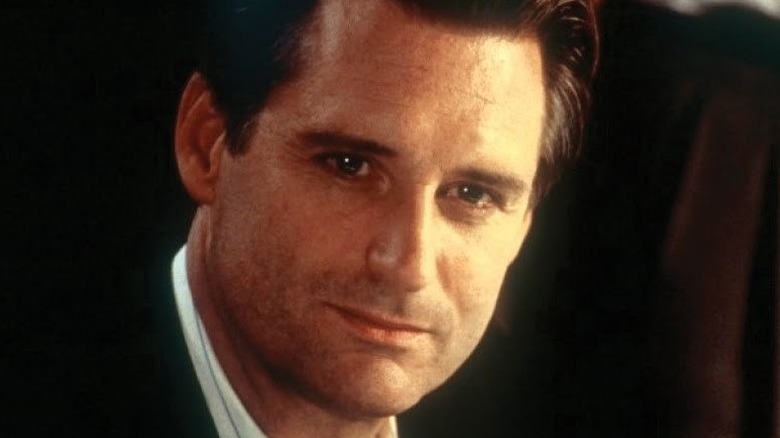Facts Only Huge Fans Know About Station Eleven
"There is no before." These words became the unofficial motto of HBO's 2021 miniseries, "Station Eleven." This 10-episode show focuses on the interwoven lives of survivors before, during, and after a virulent plague devastates the world. As an adaptation of a novel by Emily St. John Mandel, the show was guided by showrunner Patrick Somerville with the intention of fleshing out certain elements of the original story while staying true to the source material.
"Station Eleven" featured an impressive cast of actors, such as Himesh Patel, David Wilmot, Nabhaan Rizwan, and Lori Petty. Many of these actors play versions of the same character across the span of their lives, going from years before the pandemic to decades later. The main character, Kirsten, is played by an incredible new talent in Matilda Lawler as a child, while her adult self is portrayed by Mackenzie Davis. The time jumps of "Station Eleven" help to weave a complex story of love, loss, and survival across time.
While "Station Eleven" has received near-universal praise from critics and audiences, it also struggled to gain the attention that fans felt it deserved. The show currently holds a stunning 98% critic rating on Rotten Tomatoes and was nominated for seven Primetime Emmys back in 2022 for categories such as writing, directing, and lead actor in a limited series. Unfortunately, the production suffered thanks to the real-life COVID-19 pandemic.
Given its nuance and complexity, there are many interesting details about the show that you might not know. Learn all the facts that only huge fans know about "Station Eleven."
'Survival is insufficient' comes from Star Trek
If you've watched "Station Eleven" or read the original novel of the same name, you know it had a lot of catchphrases that characters repeat. These mantras, like "There is no before" and "I remember damage," exist within the show as pieces of dialogue from the "Station Eleven" comic that Kirsten becomes obsessed with after the plague. The most iconic phrase is "Survival is insufficient," which refers to the Traveling Symphony's need to express their creative passions even in the post-apocalypse. After all, what's the point of surviving if you have nothing to live for?
Although that line has become deeply associated with "Station Eleven," it turns out that author Emily St. John Mandel borrowed it from a better-known media property. The phrase "survival is insufficient" first appeared in a 1999 episode of "Star Trek: Voyager" titled "Survival Instinct," where it is uttered by the half-borg character Seven of Nine. Within the context of that show, Seven of Nine was responding to a question from Chakotay about whether it's better to live longer as a Borg drone or shorter as a free being. He asked, "A month as an individual, or a lifetime as a drone. Which option would you choose?" Seven of Nine simply replies, "Survival is insufficient." In both "Star Trek" and "Station Eleven," the phrase is used to simplify the notion that a prolonged life is meaningless without the passions that make us all human to enrich our spirits.
This isn't the only "Star Trek" mention on the show; a young Kirsten is also seen watching it at a cabin where she and Jeevan take shelter. The episode she's watching has a title drawn from Shakespeare's "Hamlet," another major influence on "Station Eleven." You can also spot a Spock figurine and a model Starship Enterprise among the items left in the airport tower where Clark establishes a museum to human-created objects.
It was Matilda Lawler's first big role
Although "Station Eleven" focuses on multiple characters over a span of 30 years, there's no doubt that Kirsten is the focal point of the entire series. Although half the time we see her as an adult in the Traveling Symphony, she is introduced as a child played by newcomer Matilda Lawler. Young Kirsten is first seen alongside Jeevan at the performance of "King Lear" that sets the plot in motion; the two become stuck with each other after the super deadly flu virus ravages the city.
Matilda Lawler played young Kirsten throughout the show, mostly in scenes taking place in 2020 or in dream sequences later on. Her performance has been hailed by critics who noted just how gifted of a performer she is for a 14-year-old. In an interview with Indiewire, Lawler discussed the unique dynamic she formed with fellow actor (and fellow Kirsten) Mackenzie Davis. She said, "We both felt connected to each other because we both knew the character already. We were representing such different parts of Kirsten's journey. We got to know each other, and it was really great." Although she is at this point most known for her work on "Station Eleven," there's no doubt we'll be seeing more of Matilda Lawler in the years to come, and she's already slated to appear in the Disney+ series "The Santa Clauses."
Dan Romer did all the music
Not only is the writing, directing, and acting of "Station Eleven" top-notch but also the music. The series was scored by an incredibly talented musician named Dan Romer, whose work may be familiar to fans of movie soundtracks. For "Station Eleven," Romer composed multiple pieces of music that gave each scene a sense of gravitas and emotional weight needed to match the ongoing drama surrounding these characters. Some of his most notable pieces of music for the show include "I Remember Damage," "Captain, I Need You to Do an Impossible Task," and "Doctor Eleven," to name just a few. The entire soundtrack is on YouTube and is definitely worth a listen even if you haven't seen the show. Romer's original soundtrack is also complemented by the use of works by other composers, like Liszt's famous "La Campanella," and diegetic music, such as the karaoke the denizens of the airport sing.
Aside from "Station Eleven," Dan Romer has made a name for himself composing music for both film and television over the past decade. He earned early success with his work on "Beasts of the Southern Wild," which earned him four Academy Award nominations in 2012. Since then, he has done music for projects like "Beasts of No Nation," "The Little Hours," "Luca," and "Dear Evan Hansen," which have continued to earn him critical acclaim. Romer also created the soundtracks for shows such as "Maniac" and "The Little Demon," as well as the Ubisoft video game "Far Cry 5."
George R.R. Martin loved the original book
"Game of Thrones" is one of HBO's biggest hits. The fantasy drama series took the world by storm thanks to its complicated narrative, exciting battle sequences, compelling lore, and the constant fear that one of your favorite characters could be killed off at any moment. Although the show had an infamously rough final season, the series remains a touchstone in the fantasy genre. The show was an adaptation of the "A Song of Ice and Fire" series of books by George R.R. Martin.
George R.R. Martin has become a household name since writing the first entry of his series, "A Game of Thrones," in 1991, spawning a massive franchise. He is responsible for writing the entire "A Song of Ice and Fire" series, "Fire and Blood," as well as actually writing some episodes of HBO's "Game of Thrones" and now "House of the Dragon."
Martin is also very vocal about promoting other writers' work whenever he gets the chance, as he did in a 2015 post on his Not A Blog website where he praised "Station Eleven." He said, "It's a deeply melancholy novel, but beautifully written, and wonderfully elegiac... a book that I will long remember, and return to." Later in 2020, he continued singing Emily St. John Mandel's praises in another post, declaring, "I guess you can say I am a big Emily St. John Mandel fanboy. I look forward to whatever she writes next." It'll be interesting to see if St. John Mandel's writing influences Martin's long-awaited and much-anticipated book, "The Winds of Winter."
Features some big Chicago landmarks
"Station Eleven" takes place in the Great Lakes area and the city of Chicago. Although this is a departure from the original setting of Toronto, showrunner Patrick Somerville deliberately changed it to Chicago, since that was a place he'd lived in and therefore was more intimately familiar with. In an interview with The Los Angeles Times, Somerville briefly explained his rationale for setting the present-day storyline in Chicago with a creative answer: "The architecture of that town speaks to the specificity of the places in Episode 1." What exactly that's supposed to mean is up to interpretation; all we know for sure is that the change worked out pretty well.
The first episode of "Station Eleven" takes place in downtown Chicago, where Jeevan and Kirsten meet after tragedy strikes during a performance of "King Lear" at the historic Auditorium Theater. From there, the show features a number of beloved city landmarks that solidify the connection between the series and Chicago. Some other notable locations that appear in "Station Eleven" are Lake Point Tower (where Frank lives), Navy Pier (where a plane crashes), Thompson Center (where Miranda has a job interview), and the Brown Line L Train (that Jeevan and Kirsten take together). A story's setting can become another character in itself, so the way "Station Eleven" uses Chicago's iconography to show the chaos of a global pandemic was particularly interesting to audiences.
Another interesting tidbit: the carpet in the airport where Clark and other characters are stranded is printed with an abstract map of the Great Lakes.
Similar to a play about The Simpsons
This may sound absurd, but one of the biggest comparisons to Emily St. John Mandel's "Station Eleven" is a semi-obscure post-apocalyptic play centered around an episode of "The Simpsons." In"Station Eleven," stories take on a second life in ways their creators never could have anticipated by their creators. A key plot element of the show is the titular book, "Station Eleven," which becomes Kirsten's obsession after it was given to her by her mentor and father figure, Arthur. In the post-plague world, an entire cult has formed around "Station Eleven" as its sacred text, with members quoting lines from it like scripture and devoid of all context.
There is a piece of black comedy performance art that touches on similar themes in 2012's "Mr. Burns, a Post-Electric Play." The story focuses on a small group of people who survive an end-of-the-world scenario and begin retelling a particular episode of "The Simpsons" for entertainment. By showing how the story changes over time, "Mr. Burns, a Post-Electric Play" demonstrates how stories can morph into entirely new and unexpected forms as a goofy cartoon is transformed into myth. While these two stories have significant differences in their approaches to examining storytelling at the end of the world, they are similar enough to warrant comparison by literary critics.
Jeevan and Kirsten were changed for the show
While there are plenty of smaller changes between the original novel and the HBO adaptation of "Station Eleven," none was as impactful as the added importance of the relationship between Jeevan and Kirsten. Kirsten is undeniably the main character and is given the most screen time as both a child and an adult. Jeevan is introduced as a man who feels responsible for helping Kirsten after the death of her father figure, Arthur Leander. Jeevan's sense of duty increases once he realizes the seriousness of the ongoing flu epidemic. Their relationship grows even closer after the two join Jeevan's brother, Frank, and survive the early days of the apocalypse together before being tragically separated for decades. Without spoiling anything for newcomers, the culmination of Jeevan and Kirsten's story is one of the most emotionally impactful moments of the series.
In the original novel, however, Jeevan's role in the story is greatly diminished compared to what he is given in the show. Jeevan only helps Kirsten find her designated guardian at the play after Arthur's death, and the two spend only a fraction of time together as a result. Once he escorts Kirsten to relative safety after the play, they never actually meet again in the novel at all, and Jeevan's fate remains unknown. These changes seemingly were for the best, since the dynamic between these two characters forms the emotional backbone of the series.
Talks of a second season
"Station Eleven" is a perfect example of a show that only needs one season to tell a complete, complex, and satisfying story without having to drag it out too long. By the end of the last episode, fans feel like they went on an emotional journey with these characters in a way that doesn't leave any unanswered questions. Despite this, there has actually been talk of a second season in the future that could continue telling stories within the "Station Eleven" world.
If there is to be another season of "Station Eleven," it probably won't follow the continued adventures of the Traveling Symphony or Kirsten at all. During an interview with Mackenzie Davis at Variety, she went into detail about how turning the show into an anthology series (a la "True Detective") would be the most interesting way to make more content while staying true to the novel. She said, "...Emily St. John Mandel, who wrote the book, has said, this isn't everybody's experience [of the apocalypse]. This is the experience of this group of people in this area of the world. There is a completely different group of people that have built an agricultural wonderland, and aren't traveling bards and aren't cobbling together this meager existence and settlements. I think that interests me more than excavating these characters." Whether or not this will actually happen remains to be seen.
Someone does the speech from Independence Day
"Station Eleven" isn't all gloom and doom. It actually has some pretty hilarious moments of levity to cut through all the drama. Twenty years after a flu ends human civilization as we know it, a group of survivors called the Traveling Symphony takes their caravan across the Great Lakes region to perform live theater for whoever's left alive. They mostly tend to do Shakespeare, but with interesting changes to match the new world they all live in.
The show gives us a glimpse of the Traveling Symphony's audition process, where prospective new members must perform a monologue of their choice for the entire troupe before they're chosen (or denied). One of the show's funniest moments comes from a zany newcomer, Dan, desperately trying to join the Symphony by auditioning for them in the second episode. Once they reluctantly agree to lend him their ears, he bursts out into a rendition of Bill Pullman's iconic speech from the 1996 disaster epic, "Independence Day." Not only does he deliver the speech flawlessly, but the show also adds the same swelling background music from the movie to really hit home the humor. It is an absolutely endearing moment that works for Dan, who is actually accepted into the group as a result. It's also interesting to see which pieces of media and pop culture have survived into this post-apocalyptic realm. It's like President Whitmore says: "We will not go quietly into the night, we will not vanish without a fight. We're going to live on. We're going to survive." That pretty much boils down the essence of "Station Eleven" in a nutshell, it seems.

